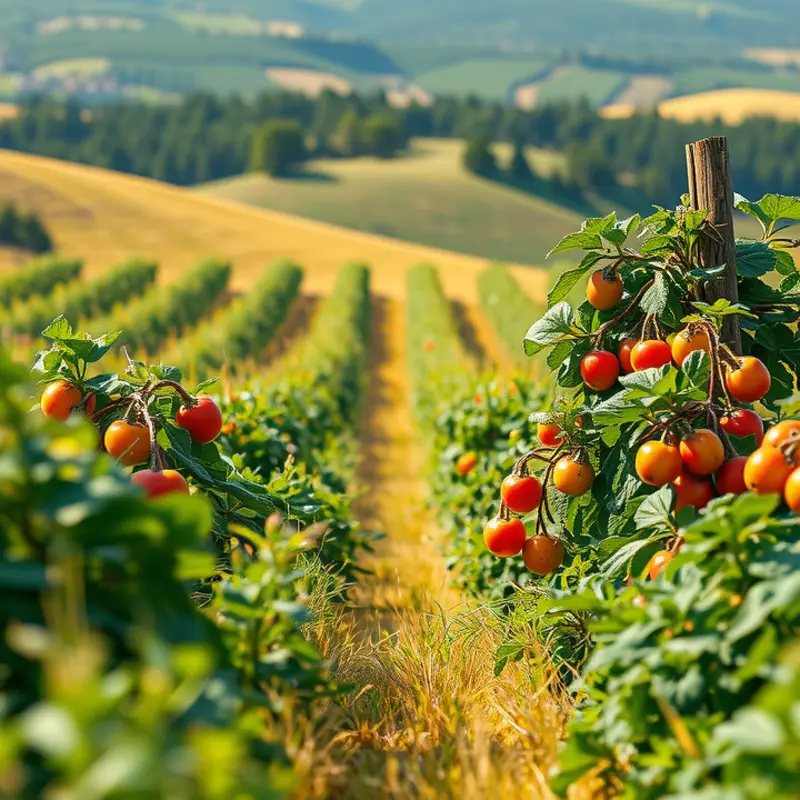The impact of our food choices on the environment is profound. From carbon emissions associated with meat production to the environmental cost of food packaging, every meal can be a step toward sustainability. For those seeking to embrace eco-friendly dining habits, making conscious decisions can lead to significant reductions in meal-related emissions, allowing you to contribute positively to the planet’s health. This exploration will help you navigate practical ways to make greener choices at the table, empowering you to align your diet with your values.
Choosing Sustainable Ingredients

Navigating the myriad of food choices available today can be overwhelming. Yet, finding a balance between delicious cuisine and environmental responsibility is essential. By selecting ingredients with lower environmental footprints, we can significantly reduce meal-related emissions and foster a more sustainable future.
Seasonal and Local Choices
Selecting seasonal and local ingredients is a straightforward way to minimize environmental impact. When you buy produce at its peak, it requires less artificial heating, lighting, and storage, reducing energy consumption. Local ingredients further cut down on transportation emissions. You can often source fresh, local produce through community-supported agriculture (CSA) programs, which support local farmers and encourage diversified farming practices.
Plant-Based Diets
Switching to a plant-based diet can greatly reduce your carbon footprint. Plant-based foods generally require fewer resources—such as water and land—and produce less greenhouse gas emissions than animal products. Incorporating more vegetables, legumes, fruits, and grains into your meals is a step towards a more sustainable diet. For insight into transitioning to a plant-based diet, you might find easy plant-based eating tips to be particularly useful.
Organic vs. Conventional Agriculture
There’s a nuanced discussion around organic versus conventional farming methods. Organic farming restricts synthetic pesticides and fertilizers, potentially minimizing pollution and promoting soil health. However, it may not always be more sustainable than conventional methods, depending on location and practices. Evaluate the certifications and practices of local producers to make informed choices that align with your values.
Mindful Consumption
Mindful consumption plays a crucial role in sustainable eating. By being conscious of portion sizes and food waste, you’re not only preserving resources but also discouraging wasteful practices throughout the supply chain. Planning meals and understanding how to store ingredients properly can significantly reduce waste. For practical tips on minimizing food waste, consider exploring low-waste cooking and prep.
Embracing sustainable ingredients requires a shift in perspective and habits. But with each thoughtful choice, you contribute to a healthier planet and community, demonstrating that thoughtful culinary choices can effect meaningful change.
Adopting Efficient Cooking Practices

Cooking efficiently not only saves time but also reduces energy use, making it a critical component of sustainable eating. One of the most effective tools for energy-efficient cooking is the pressure cooker. By increasing the pressure and temperature inside the pot, it cooks food faster than conventional methods, cutting down on cooking times and energy consumption. Meals such as stews, beans, and grains are ideal candidates for pressure cooking, reducing the energy footprint while retaining nutrients.
Slow cookers are another excellent energy-saving option, especially for those who prefer to plan meals ahead. These devices operate at lower temperatures and use minimal electricity over extended periods. By preparing ingredients in advance and letting them simmer throughout the day, you can make soups, curries, and casseroles that are both delicious and energy-efficient.
Induction stoves offer another technological leap forward. They use electromagnetic energy to directly heat pots and pans, leaving surrounding surfaces cool and reducing energy waste. In comparison to traditional gas or electric cooktops, induction stoves are typically more efficient and quicker at bringing water to a boil or searing foods.
Meal planning is another cornerstone of efficient cooking. Planning meals around in-season produce not only supports local agriculture but also minimizes the carbon emissions involved in transportation. Consider adopting meal preparation strategies such as using practical ingredient batching for a streamlined cooking process. By prepping and cooking multiple meals at once, you can reduce the need for frequent kitchen sessions and leverage your equipment’s energy for larger batches.
Efficient food storage is equally important to minimize waste. Properly storing leftovers in suitable containers extends their freshness, reducing food waste and the energy needed to produce and transport new food. Explore ways to extend the life of sauces, vegetables, and grains using eco-smart practices.
Zero-waste cooking principles resonate well with sustainable culinary practices. Vegetable scraps that usually end up in the trash can be repurposed as vegetable broth bases or composted to enrich garden soil. Similarly, stale bread might find new life in bread puddings or croutons, demonstrating that creativity can turn potential waste into culinary gold.
Adopting these energy-efficient practices not only supports the planet but can also lead to healthier lifestyles. When understanding the carbon footprint associated with cooking, we see that every choice in the kitchen counts. By implementing efficient cooking methods and reducing waste, it becomes possible to enjoy a delicious, low-impact culinary experience.
Final words
Making eco-friendly food choices involves more than just eating less meat; it requires a holistic approach that encompasses everything from ingredient selection to cooking methods. By prioritizing sustainable ingredients and adopting efficient culinary practices, you can play an active role in reducing meal-related emissions. Each meal is an opportunity to make choices that reflect your values and contribute to a healthier planet. Whether you start with minor adjustments or embrace a complete overhaul of your cooking habits, every step counts. Together, we can cultivate a sustainable future, one meal at a time.








